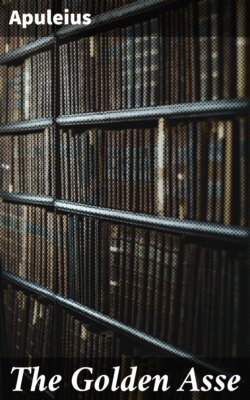Читать книгу The Golden Asse - Apuleius - Страница 5
На сайте Литреса книга снята с продажи.
The Life of Lucius Apuleius Briefly Described
ОглавлениеTable of Contents
LUCIUS APULEIUS African, an excellent follower of Plato his sect, born in Madaura, a Countrey sometime inhabited by the Romans, and under the jurisdiction of Syphax, scituate and lying on the borders of Numidia and Getulia, whereby he calleth himself half a Numidian and half a Getulian: and Sidonius named him the Platonian Madaurence: his father called Theseus had passed all offices of dignity in his countrey with much honour. His mother named Salvia was of such excellent vertue, that she passed all the Dames of her time, borne of an ancient house, and descended from the philosopher Plutarch, and Sextus his nephew. His wife called Prudentila was endowed with as much vertue and riches as any woman might be. Hee himselfe was of an high and comely stature, gray eyed, his haire yellow, and a beautiful personage. He flourished in Carthage in the time of Iolianus Avitus and Cl. Maximus Proconsuls, where he spent his youth in learning the liberall sciences, and much profited under his masters there, whereby not without cause hee calleth himself the Nource of Carthage, and the celestial Muse and venerable mistresse of Africke. Soone after, at Athens (where in times past the well of all doctrine flourished) he tasted many of the cups of the muses, he learned the Poetry, Geometry, Musicke, Logicke, and the universall knowledge of Philosophy, and studied not in vaine the nine Muses, that is to say, the nine noble and royal disciplines.
Immediately after he went to Rome, and studied there the Latine tongue, with such labour and continuall study, that he achieved to great eloquence, and was known and approved to be excellently learned, whereby he might worthily be called Polyhistor, that is to say, one that knoweth much or many things.
And being thus no lesse endued with eloquence, than with singular learning, he wrote many books for them that should come after: whereof part by negligence of times be now intercepted and part now extant, doe sufficiently declare, with how much wisdome and doctrine hee flourished, and with how much vertue hee excelled amongst the rude and barbarous people. The like was Anacharsis amongst the most luskish Scythes. But amongst the Bookes of Lucius Apuleius, which are perished and prevented, howbeit greatly desired as now adayes, one was intituled Banquetting questions, another entreating of the nature of fish, another of the generation of beasts, another containing his Epigrams, another called 'Hermagoras': but such as are now extant are the foure books named 'Floridorum', wherein is contained a flourishing stile, and a savory kind of learning, which delighteth, holdeth, and rejoiceth the reader marvellously; wherein you shall find a great variety of things, as leaping one from another: One excellent and copious Oration, containing all the grace and vertue of the art Oratory, where he cleareth himself of the crime of art Magick, which was slanderously objected against him by his Adversaries, wherein is contained such force of eloquence and doctrine, as he seemeth to passe and excell himselfe. There is another booke of the god of the spirit of Socrates, whereof St. Augustine maketh mention in his booke of the definition of spirits, and description of men. Two other books of the opinion of Plato, wherein is briefly contained that which before was largely expressed. One booke of Cosmography, comprising many things of Aristotles Meteors. The Dialogue of Trismegistus, translated by him out of Greeke into Latine, so fine, that it rather seemeth with more eloquence turned into Latine, than it was before written in Greeke. But principally these eleven Bookes of the 'Golden Asse', are enriched with such pleasant matter, with such excellency and variety of flourishing tales, that nothing may be more sweet and delectable, whereby worthily they may be intituled The Bookes of the 'Golden Asse', for the passing stile and matter therein. For what can be more acceptable than this Asse of Gold indeed. Howbeit there be many who would rather intitule it 'Metamorphosis', that is to say, a transfiguration or transformation, by reason of the argument and matter within.
